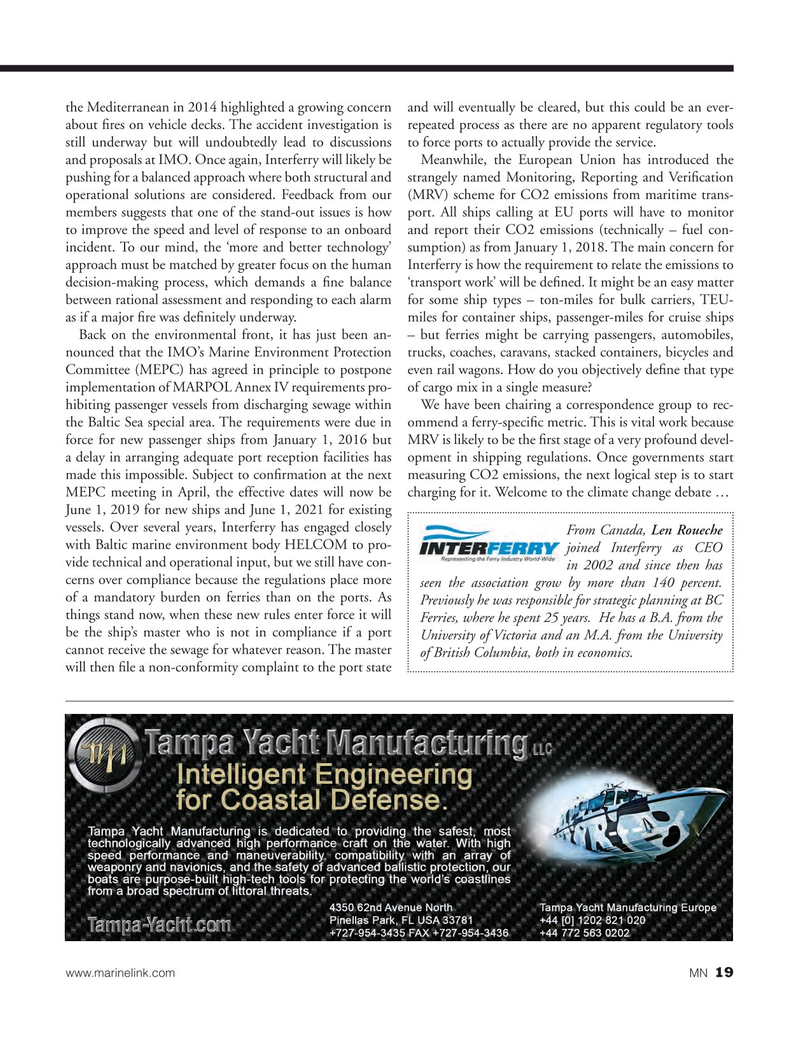
Page 19: of Marine News Magazine (January 2016)
Read this page in Pdf, Flash or Html5 edition of January 2016 Marine News Magazine
the Mediterranean in 2014 highlighted a growing concern and will eventually be cleared, but this could be an ever- about ? res on vehicle decks. The accident investigation is repeated process as there are no apparent regulatory tools still underway but will undoubtedly lead to discussions to force ports to actually provide the service.
and proposals at IMO. Once again, Interferry will likely be Meanwhile, the European Union has introduced the pushing for a balanced approach where both structural and strangely named Monitoring, Reporting and Veri? cation operational solutions are considered. Feedback from our (MRV) scheme for CO2 emissions from maritime trans- members suggests that one of the stand-out issues is how port. All ships calling at EU ports will have to monitor to improve the speed and level of response to an onboard and report their CO2 emissions (technically – fuel con- incident. To our mind, the ‘more and better technology’ sumption) as from January 1, 2018. The main concern for approach must be matched by greater focus on the human Interferry is how the requirement to relate the emissions to decision-making process, which demands a ? ne balance ‘transport work’ will be de? ned. It might be an easy matter between rational assessment and responding to each alarm for some ship types – ton-miles for bulk carriers, TEU- as if a major ? re was de? nitely underway. miles for container ships, passenger-miles for cruise ships
Back on the environmental front, it has just been an- – but ferries might be carrying passengers, automobiles, nounced that the IMO’s Marine Environment Protection trucks, coaches, caravans, stacked containers, bicycles and
Committee (MEPC) has agreed in principle to postpone even rail wagons. How do you objectively de? ne that type implementation of MARPOL Annex IV requirements pro- of cargo mix in a single measure? hibiting passenger vessels from discharging sewage within We have been chairing a correspondence group to rec- the Baltic Sea special area. The requirements were due in ommend a ferry-speci? c metric. This is vital work because force for new passenger ships from January 1, 2016 but MRV is likely to be the ? rst stage of a very profound devel- a delay in arranging adequate port reception facilities has opment in shipping regulations. Once governments start made this impossible. Subject to con? rmation at the next measuring CO2 emissions, the next logical step is to start
MEPC meeting in April, the effective dates will now be charging for it. Welcome to the climate change debate …
June 1, 2019 for new ships and June 1, 2021 for existing vessels. Over several years, Interferry has engaged closely
From Canada, Len Roueche with Baltic marine environment body HELCOM to pro- joined Interferry as CEO vide technical and operational input, but we still have con- in 2002 and since then has cerns over compliance because the regulations place more seen the association grow by more than 140 percent. of a mandatory burden on ferries than on the ports. As
Previously he was responsible for strategic planning at BC things stand now, when these new rules enter force it will
Ferries, where he spent 25 years. He has a B.A. from the be the ship’s master who is not in compliance if a port
University of Victoria and an M.A. from the University cannot receive the sewage for whatever reason. The master of British Columbia, both in economics.
will then ? le a non-conformity complaint to the port state www.marinelink.com MN 19
MN Jan16 Layout 18-31.indd 19 1/6/2016 2:46:12 PM

 18
18

 20
20
